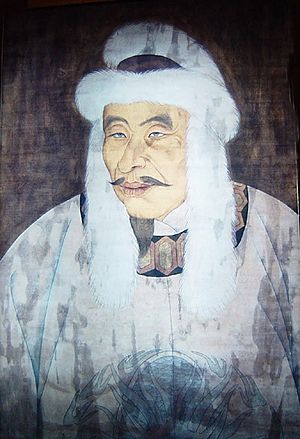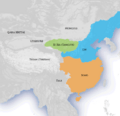Jurchen people facts for kids
The Jurchens were a group of people who lived in Manchuria, a region in what is now Northeast China. They spoke a language from the Tungusic family. They were known as Jurchens until the 1600s, when they started being called the Manchu. The Jurchens were powerful enough to create their own empire, known as the Jin Dynasty. The Joseon Dynasty of Korea valued having "neighborly relations" (called gyorin) with the Jurchen people.
Contents
Jurchen Culture and Lifestyle
The Jurchens generally lived a lifestyle similar to early nomadic people who herded animals on the steppes (large grasslands). Like the Khitans and Mongols, they were proud of their strength, their skill at riding horses, archery, and hunting. They believed in spirits and had spiritual leaders called shamans. They also believed in a main god of the sky.
Language and Writing
The early Jurchen writing system was based on the Khitan script, which itself was inspired by Chinese characters. The written Jurchen language disappeared soon after the Jin Dynasty fell. However, people continued to speak the language. Until the end of the 1500s, when Manchu became the new main written language, the Jurchens used a mix of Mongolian and Chinese for writing.
Society and Leadership
The Jurchen society was greatly influenced by the Mongols. Also like the Mongols and the Turks, the Jurchens did not have a rule that the oldest son would automatically become the next leader. According to their traditions, any capable son or nephew could be chosen to lead the group.
Respect for Dogs
Even though their ancestors did not respect dogs, the Jurchens began to respect dogs around the time of the Ming dynasty. They passed this tradition on to the Manchus. It was forbidden in Jurchen culture to use dog skin. It was also against their rules to harm, kill, or eat dogs. The Jurchens thought it was very bad for Koreans to use dog skin.
Images for kids
-
A 1682 Italian map showing the "Kingdom of the Niuche" (Jurchens) or the "Kin (Jin) Tartars", who "have occupied and are at present ruling China", north of Liaodong and Korea
See also
 In Spanish: Yurchen para niños
In Spanish: Yurchen para niños









